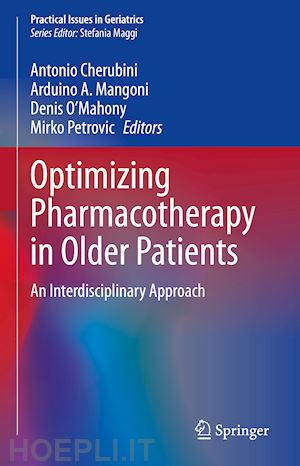

Questo prodotto usufruisce delle SPEDIZIONI GRATIS
selezionando l'opzione Corriere Veloce in fase di ordine.
Pagabile anche con Carta della cultura giovani e del merito, 18App Bonus Cultura e Carta del Docente
This book summarizes the broad and rapidly evolving field of geriatric pharmacotherapy, which is becoming increasingly relevant for practicing physicians who care and prescribe medications for older patients. Around the globe, ageing populations are associated with an increased prevalence of chronic diseases. Older adults are often affected by multimorbidity, i.e., suffer from more than one chronic disease. The main consequence of multimorbidity is polypharmacy, which is commonly defined as the regular use of five or more medicines. Polypharmacy has now reached epidemic proportions in our societies, and is associated with an increased risk of drug-drug interactions, drug-disease interactions and adverse drug reactions. The management of polypharmacy in older patients with complex multimorbidity poses several challenges and needs to be based on specific knowledge and prescribing expertise.
The aim of this book is to provide a comprehensive update on thefield, and to share the expertise needed to optimize the management of pharmacotherapy in older patients.
Section 1: General issues.- 1. The impact of ageing on pharmacokinetics.- 2. Polypharmacy: Definition, Epidemiology, Consequences and Solutions.- 3. Drug–Drug and Drug–Nutrients Interactions: From Theory to Clinical Relevance.- 4. Inappropriate Prescription of Medicines.- 5. Prescribing Cascades.- 6. Adverse Drug Reactions in Older People: a 21st Century View.- 7. Adherence: How to Measure and Improve It.- 8. Medication reconciliation and review: theory, practice and evidence.- 9. The role of pharmacists in optimizing drug therapy.- 10. Deprescribing: Evidence base and implementation.- Section 2: Geriatric syndromes and common chronic conditions.- 11. General principles of management of patients with multimorbidity and frailty.- 12. Frailty and Drug Therapy.- 13. Falls and Impaired mobility.- 14. Delirium.- 15. Incontinence.- 16. Constipation.- 17. Pain.- 18. Hypertension.- 19. Heart Failure.- 20. Pharmacological treatment of cognitive and behavioral disorders in dementia.- 21. Pharmacological treatment of osteoporosis in older patients.- 22. Chronic respiratory disease: COPD, IPF.- 23. Diabetes.- 24. Stroke therapeutics in the care of older persons.- 25. Optimizing pharmacotherapy in older patients with depression or anxiety.- 26. Nutritional Deficiency and Malnutrition.- 27. Pharmacotherapy of Insomnia in older adults.- 28. Chronic kidney disease.- 29. Palliation at End of Life.
Antonio Cherubini is Director of the Department of geriatric pathways of frailty, continuity of care and rehabilitation, unit of Geriatria, Accettazione geriatrica e Centro di ricerca per l’invecchiamento at IRCCS INRCA, Ancona, Italy. He is an Associate Professor of Gerontology and Geriatrics at the University of Perugia Medical School. He is a member of the Geriatric Expert Group at the European Medicine Agency and Academic Director of the European Geriatric Medicine Society (EuGMS). Author of more than 400 papers in peer-reviewed journals, he is also an associate Editor of the journal European Geriatric Medicine. His main research interests are: comprehensive geriatric assessment; geriatric pharmacotherapy, including inappropriate prescription; adverse drug reactions and exclusion of older subjects from clinical research; delirium; frailty and sarcopenia.
Arduino A Mangoni trained in Cardiology, Clinical Pharmacology and General Medicine in Milan, Boston and London. He was awarded a PhD in Pharmacology at King’s College, University of London, in 2003. He served as a Senior Lecturer (2003-2007) and Associate Professor (2007-2009) of Clinical Pharmacology at Flinders University before taking up the Chair in Medicine of Old Age at the University of Aberdeen, UK (2010-2012). In 2013 he was appointed as Strategic Professor of Clinical Pharmacology at Flinders University and Head of the Department of Clinical Pharmacology at Flinders Medical Centre. His interests include pharmacoepidemiology and drug safety in old age. Professor Mangoni has authored 350 peer-reviewed publications.Denis O’Mahony is an Associate Professor at the Department of Medicine, University College Cork, and consultant physician in geriatric medicine at Cork University Hospital, Ireland. His special interest is pharmacotherapy in older people, specifically inappropriate prescribing in late life and its consequences. He created the widely used STOPP/START criteria for inappropriate prescribing, recently coordinated the EU FP7-funded project SENATOR, and was a co-principal investigator in the EU Horizon 2020 project OPERAM; both projects focused on the effect of software-delivered STOPP/START criteria on adverse clinical outcomes for older people in hospital. To date, he has over 220 peer-reviewed publications, mostly on pharmacotherapy in late life.
Mirko Petrovic is a Full Professor of Geriatrics and Clinical Pharmacology and the chairman of the Department of Internal Medicine and Paediatrics at the Faculty of Medicine and Health Sciences, Ghent University, Belgium. He is a member of the Geriatric Expert Group at the European Medicine Agency (EMA) and the President-elect of the European Geriatric Medicine Society (EuGMS). The main focus of his research is on patterns and quality of drug prescribing in older people; the extent to which prescribing is tailored to real medical needs; indicators for identifying prescribing which is not in line with existing guidelines; and the implementation of a better prescribing policy. He participated as co-principal investigator in two EU FP7-funded projects, SENATOR and MID-FRAIL, and is currently taking part in the EU H2020-funded AFFIRMO project. He is the author of 330 peer-reviewed publications, mainly in the field of geriatric pharmacotherapy.











Il sito utilizza cookie ed altri strumenti di tracciamento che raccolgono informazioni dal dispositivo dell’utente. Oltre ai cookie tecnici ed analitici aggregati, strettamente necessari per il funzionamento di questo sito web, previo consenso dell’utente possono essere installati cookie di profilazione e marketing e cookie dei social media. Cliccando su “Accetto tutti i cookie” saranno attivate tutte le categorie di cookie. Per accettare solo deterninate categorie di cookie, cliccare invece su “Impostazioni cookie”. Chiudendo il banner o continuando a navigare saranno installati solo cookie tecnici. Per maggiori dettagli, consultare la Cookie Policy.